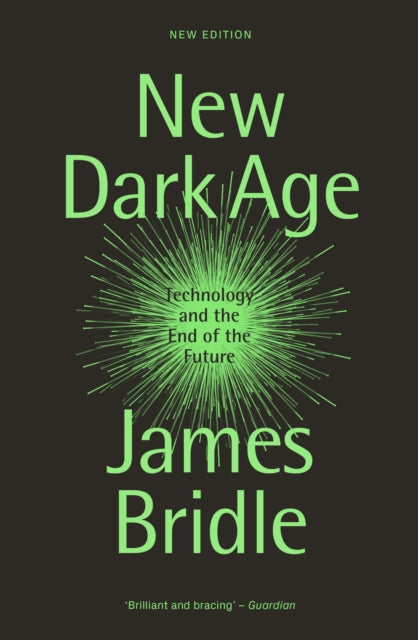James Bridle
New Dark Age: Technology and the End of the Future
New Dark Age: Technology and the End of the Future
YOU SAVE £2.27
- Condition: Brand new
- UK Delivery times: Usually arrives within 2 - 3 working days
- UK Shipping: Fee starts at £2.39. Subject to product weight & dimension
Bulk ordering. Want 15 or more copies? Get a personalised quote and bigger discounts. Learn more about bulk orders.
Couldn't load pickup availability
- More about New Dark Age: Technology and the End of the Future
The increasing inscrutability of our times is driven by the belief that quantitative data can provide a coherent model of the world, but the sheer volume of information available reveals less than we hope. James Bridle warns against the future in which the contemporary promise of a new technologically assisted Enlightenment may deliver its opposite: an age of complex uncertainty, predictive algorithms, surveillance, and the hollowing out of empathy.
Format: Paperback / softback
Length: 320 pages
Publication date: 14 March 2023
Publisher: Verso Books
In today's rapidly evolving world, we are faced with a growing sense of inscrutability. Our news feeds are inundated with unverified and unverifiable speculation, often generated automatically by anonymous software. As a result, we struggle to comprehend the events happening around us. At the heart of this phenomenon lies the belief that quantitative data can provide a coherent model of the world, and that computable information can guide us in navigating it effectively. However, the sheer volume of information available to us today suggests that we are entering a new Dark Age, characterized by an ever-increasing incomprehension.
In his insightful new book, renowned artist and writer James Bridle cautions us about the potential consequences of this trend. He explores the history of art, technology, and information systems, highlighting the dark clouds that gather over discussions of the digital sublime. Bridle argues that the contemporary promise of a new technologically assisted Enlightenment may lead us astray, instead delivering an age of complex uncertainty, predictive algorithms, surveillance, and the erosion of empathy.
One of the central themes of Bridle's work is the notion of "information overload." He argues that the vast amount of data we are exposed to daily overwhelms our cognitive abilities, making it difficult for us to process and understand. This leads to a reliance on algorithms and automated systems, which can make decisions and predictions without human intervention but may lack the empathy and understanding necessary for meaningful interactions.
Bridle also explores the role of surveillance in this new age. With the increasing use of cameras, sensors, and tracking technologies, we are constantly being monitored and tracked. This surveillance not only erodes our privacy but also contributes to a sense of disempowerment and isolation. We become increasingly dependent on systems that control and monitor us, rather than being active participants in our own lives.
Another alarming aspect of Bridle's work is the rise of predictive algorithms. These algorithms are designed to analyze large amounts of data and make predictions about our behavior and preferences. While they can be useful in certain contexts, such as medical diagnosis or financial forecasting, they can also be used to manipulate and control us. By tailoring advertisements, news stories, and social media content to our specific interests and preferences, algorithms can create a sense of complacency and conformity, limiting our ability to think critically and challenge dominant narratives.
Bridle also raises concerns about the hollowing out of empathy in this new age. With the increasing reliance on technology and automation, we lose touch with the human experience and the complexities of interpersonal relationships. We become more isolated and disconnected, unable to understand and connect with others on a deeper level. This lack of empathy can have serious consequences for our social and political systems, as it can lead to a breakdown in trust and cooperation.
In conclusion, James Bridle's book offers a timely warning about the potential dangers of the digital age. He challenges the belief that quantitative data can provide a coherent model of the world and highlights the risks associated with the reliance on computable information. By exploring the history of art, technology, and information systems, Bridle provides a critical analysis of the trends that are shaping our contemporary world. He calls for a more nuanced and empathetic approach to technology, one that recognizes the importance of human agency and empathy in navigating the complex uncertainties of the digital age.
Weight: 250g
Dimension: 197 x 129 x 22 (mm)
ISBN-13: 9781804290422
Edition number: New ed
This item can be found in:
UK and International shipping information
UK and International shipping information
UK Delivery and returns information:
- Delivery within 2 - 3 days when ordering in the UK.
- Shipping fee for UK customers from £2.39. Fully tracked shipping service available.
- Returns policy: Return within 30 days of receipt for full refund.
International deliveries:
Shulph Ink now ships to Australia, Belgium, Canada, France, Germany, Ireland, Italy, India, Luxembourg Saudi Arabia, Singapore, Spain, Netherlands, New Zealand, United Arab Emirates, United States of America.
- Delivery times: within 5 - 10 days for international orders.
- Shipping fee: charges vary for overseas orders. Only tracked services are available for most international orders. Some countries have untracked shipping options.
- Customs charges: If ordering to addresses outside the United Kingdom, you may or may not incur additional customs and duties fees during local delivery.


